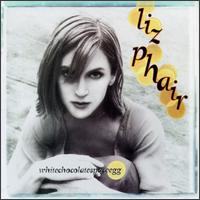
Liz Phair
whitechocholatespaceegg (Matador/Capitol)
by Marc Hirsh

Liz Phair
whitechocholatespaceegg (Matador/Capitol)
by Marc Hirsh
originally published in Space City Rock, Fall 1999
I'm pretty sure that whitechocolatespaceegg is Liz Phair's attempt to totally rebut everything she's done up until now. She takes her cue from "Ride," which fades out with Phair repeating a rather telling mantra of "regeneration." The sound of a former bohemian and shitstirrer coming to terms with "adulthood," the album stands as something of a complement to Amy Rigby's Middlescence (about the transition from adulthood to the unknown beyond). In subject, anyway; in quality, it's the polar opposite. While Rigby's is a wonderful album that often doesn't sound very good, Phair's sounds terrific but doesn't make the grade where it counts.
The problem is that Phair is capable of anything (yes, anything ), and as a result, there's no sense of focus. And when she can't latch onto something, it's a mess. Listen to "Headache;" sure, it sounds great, but that only underscores how empty the song really is when you listen closer. It's an interesting paradox: unfinished songs (with which Phair's previous albums are littered) can sound great only when they sound unfinished (go ask Guided By Voices).
When songs show their heads, though, they're worth the wait. The opening "White Chocolate Space Egg" thunders for the first time in Phair's short (ha!) career, twisting around in a melody that flirts with discord before resolving in a surprising major-key declaration of absolute acquiescence to her life-altering baby. "Johnny Feelgood" may be masochistic and misogynistic as hell (two avenues Phair has explored in the past), but it finds a melody and a groove, rides both until it hurts and provides, when Phair's voice fails her at the end of the first chorus, one of the album's genuinely thrilling moments. The folky "Perfect World" makes an appealing plea for the life of simplicity that escapes you when you're living like, well, Phair (or her characters) seemed to on her previous albums. The album's last great song, "Ride," hits at the 3/4 mark, but the buzz lingers long enough to make you think the rest of the record's pretty good (it's not). The good cuts are reminders that Phair's in love with melody, these days a rarity and all the more ironic considering her trademark deadpan, still in evidence. In fact, that may well be the key to the album's overall failure: distanced boredom may work when trying to defuse sexuality but it can kill attempts at honest emotion.
Bigger blunders mostly happen when Liz tries to sound like anybody else. Or maybe she doesn't try, maybe it just happens. Either way, it fails her, and big. "Big Tall Man" possesses a chorus that resembles nothing so much as Bettie Serveert on a good day. It's enjoyable in its fashion and normally wouldn't be something to quibble about, but it's a liability for someone used to setting precedents, not following them. So when "Only Son" decides it wants to be "Saturday Night's Alright For Fighting," intentional or not, it doesn't indicate a change for the better. Faring worse are the Casio country and western of "Baby Got Going" and the pseudo-worldbeatish "Uncle Alvarez," in which the narrator creates a smug and precious made-up family history of the anonymous picture on the wall.
In "Big Tall Man," Phair brags, "I can be a complicated communicator." Thing is, she spends the rest of the album neglecting to back it up with hard evidence. That's basically the story with the whole album, which has an exceptionally cool cover (with hair like the day after There's Something About Mary ) wrapped around an uneven product. It's a superficial triumph of sound that caves in if you prod it to far, leaving you with a whiff of stale air. This egg is hollow.